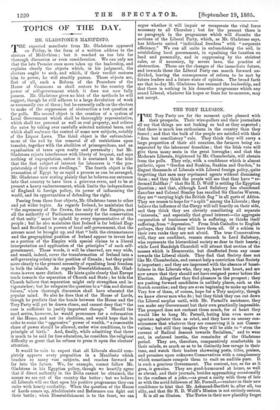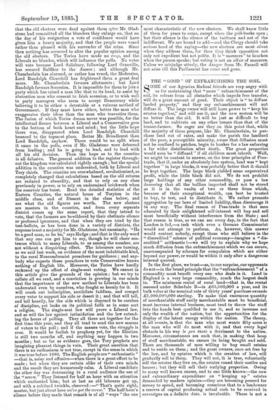THE TORY ILLUSION. T HE Tory Party are for the moment
quite pleased with their prospects. Their wire-pullers and their journalists all say that things are not looking so bad as they expected ; that there is much less enthusiasm in the country than they feared ; and that the bulk of the people are satisfied with their "firm but conciliatory" rule. They think they will carry a large proportion of their old counties, the farmers being ex- asperated by the labourers' franchise ; that the Irish vote will give them many seat a in the great boroughs ; and that the Moderate Liberals, frightened by Mr. Chamberlain, will abstain from the polls. They rely, with a confidence which is almost pathetic, upon "Gordon and Suakim, Suakim and Gordon," to disgust thousands of Liberals with Liberal foreign policy, quite forgetting that men may reprimand agents without dismissing them ; and they think the people will see that they have "re- deemed Zulfikar ;" that Sir H. D. Wolff is settling the Egyptian Question ; and that, although Lord Salisbury has abandoned Zanzibar and Colonel Stanley has recalled Sir Charles Warren, they are "carrying high the British flag" in all parts of Africa. They see reason to hope for "a split" among the Liberals ; they believe the influence of the Clergy will tell heavily on their side, and they think they are cleverly conciliating all separate "interests," and especially that grand interest—the aggregate corporation of businesses which is suffering, or thinks itself suffering, from "depression." From Irish Catholics to English potboys, they think they will have them all. Of a schism in their own ranks they are not afraid. The true Conservatives will, they are confident, remain staunch to Lord Salisbury, who represents the hierarchical society so dear to their hearts ; while Lord Randolph Churchill will attract that section of the masses which is Democratic, but disaffected from any cause towards the Liberal chiefs. They find that Society does not like Mr. Chamberlain, and cannot help a conviction that Society is important ; and they are impressed with the absence of boast- fulness in the Liberals who, they say, have lost heart, and are now aware that they should not have resigned power before the Election. Altogether they find pleasure in the prospect ; they are pushing forward candidates in unlikely places, such as the Scotch counties; and they are even beginning to make up tables. Very few of them, of course, hope for a Tory majority, though we know clever men who do ; but they think they can cut down the Liberal surplus until, with Mr. Parnell's assistance, they can make any Government but their own practically impossible. The prospect does not enchant them much, for at heart they would like to hang Mr. Parnell, hating him even more as agrarian agitator than as rebel, and they have an uneasy con- sciousness that whatever they are conserving it is not Conser- vatism; but still they imagine they will be able to "stem the current of Radical descent towards Socialism," and to wear out, in enforced inertia, the remainder of the Gladstone period. They are, therefore, comparatively comfortable in their minds, so much so as to be distinctly less savage in their tone, and watch their leaders showering posts, titles, praises, and promises upon unknown Conservatives with a complacency which sometimes compels them to emit an audible purr. It is such a gracious Government. The content, too, so far as it goes, is genuine. They are good-humoured at home, as well as abroad, and their journals, besides approaching occasionally to the confines of a joke,—as great a rarity with them of late as with the acrid followers of Mr. Parnell,—venture in their new confidence to hint that Mr. Ashmead-Bartlett is, after all, too silly, and that Sir H. D. Wolff's Mission is not entirely serious. It is all an illusion. The Tories in their new placidity forget that the old electors were dead against them after Mr. Glad- stone had committed all the blunders they enlarge on, that on the day of his resignation a vote of confidence would have given him a heavy majority, and that the people were vexed rather than pleased with his surrender of the reins. Since then nothing has occurred to alter the popular opinion among the old electors. The Tories have made no coup, and the Liberals no blunder, which will influence the polls. No voter will vote because Lord Salisbury, following Lord Granville, has secured Zulfikar to the Ameer ; and although Mr. Chamberlain has alarmed, or rather has vexed, the Moderates, Lord Randolph Churchill has frightened them a great deal more. Mr. Chamberlain favours allotments ; but Lord Randolph favours Secession. It is impossible for them to join a party which has raised a man like that to its head, to assist by abstention men who consent to Irish secession, or to wish well to party managers who seem to accept Democracy while believing it to be either a detestable or a ruinous method of Government. If they must have either, better the man who exaggerates their ideas than the man who travesties them. The fusion of which Tories dream never was possible, for the intellectual fissure between a Liberal and a Conservative goes to the bottom of both heart and mind ; but the little hope there was, disappeared when Lord Randolph Churchill bounced to the topmost place. Better Mr. Broadhurst than Lord Randolph, anyhow. There would be no split when it came to the polls, even if Mr. Gladstone were debarred from leading ; and he is going to lead, and to lead with all his old decision. Then the hope as to the counties is all delusive. The general addition to the register through- out the kingdom was calculated rightly enough ; but the special addition in the counties was underrated, both by Liberal and Tory chiefs. The counties are overwhelmed, revolutionised, so completely changed that calculations based on the old returns are reduced to absurdity, and that to rely on any class previously in power, is to rely on undermined brickwork when the reservoir has burst. Read the detailed statistics of the Eastern Counties, the natural home of Toryism in the middle class, and of Dissent in the class below, and see what the old figures are worth. The new electors are masters in the counties, and from every separate district comes up the same report, that they intend to vote, that the farmers are bewildered by their obstinate silence or professed ignorance, and that when they are tried by the test-ballots, as has been done in a variety of districts, the response is not a majority for Mr. Gladstone, but unanimity. "He be a good man, so he be," says Hodge ; and that is the only word that any one can get him to say, though he will cheer sen- tences which to many Liberals, to us among the number, are not without a disquieting effect. The labourers are turning, as we said last week, on evidence of the most indubitable kind, to the rural Noncomformist preachers for guidance ; and any- body who expects those preachers to vote Conservative knows nothing of English life. Moreover, the Tories have hardly reckoned up the effect of single-seat voting. We cannot in this article give the grounds of the opinion ; but we try to collate all we read, and a conviction is growing in our minds that the importance of the new method to Liberals has been underrated even by ourselves, who fought so keenly for it. It will crush out indiscipline, annihilate faddism, and compel every voter to support his side or desert it ; and that will tell, and tell heavily, for the side which is disposed to be careless of discipline, yet looks on its political faith as in some sort a religion. The single-seat law will prove a Liberal law, and so will the law against intimidation and the law extend- ing the hours of polling. They all three act together for the first time this year, and they all tend to send the new masses of voters to the poll ; and if the masses vote, the struggle is over. It would be foolish t6 prophesy yet, for the Election is still two months off, and anything may happen in two months ; but so far as evidence goes, the Tory prophets are imagining pleasant things in vain. Their great assertion that there is no enthusiasm is not true, except in the sense in which it was true before 1880. The English people are" enthusiastic" —that is, noisy and effusive—when there is a great effort to be made ; but when they are certain alike of their own minds and the result they are humorously calm. A Liberal candidate the other day was denouncing to a rural audience the use of the "screw." They listened for half an hour with an attention which enchanted him; but at last an old labourer got up, and with a subdued twinkle, observed That's quite right, master, but just about here we've got the screw." The half hour's silence before they made that remark is of all "ways "the one most characteristic of the new electors. We shall know little of them for years to come, except when the poll-books open ; but their silence is the silence of the taciturn and not of the indifferent. We are bound to add—and the Clergy should take serious heed of the saying—the new electors are most silent when they address them, for then they think opposition not only not expedient but not polite. It is " manners " to hearken when the parson speaks; but voting is not an affair of manners. Unless we misjudge utterly, the danger from Mr. Parnell will not arise till this Parliament has come and gone.



































 Previous page
Previous page